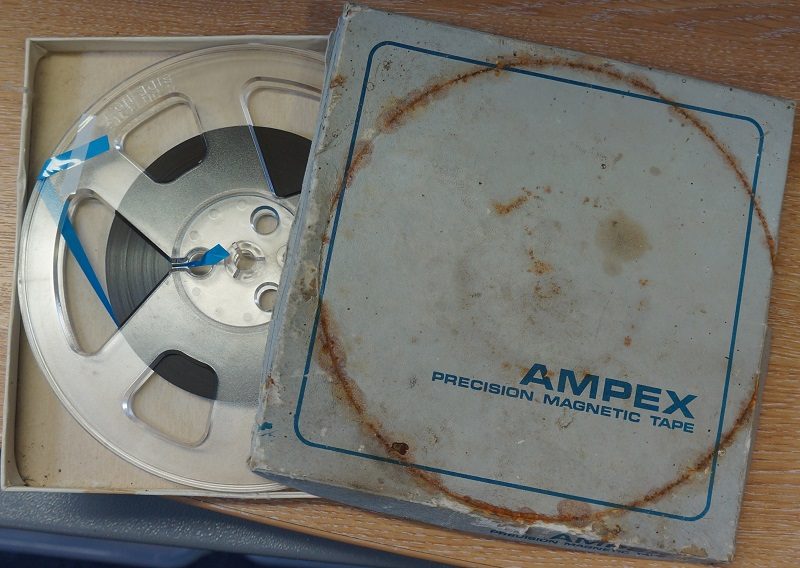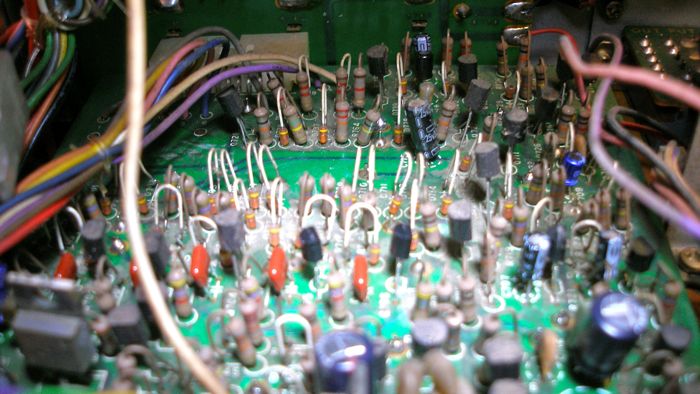Often the tapes we receive to digitise are ‘forgotten’ recordings. Buried under a pile of stuff in a dark, cold room, their owners think they are lost forever. Then, one day, a reel of the mysterious tape emerges from the shadows generating feelings of excitement and anticipation. What is stored on tape? Is the material in a playable condition? What will happen to the tape once it is in a digital format?
All of these things happened recently when Paul Travis sent us a ¼ inch AMPEX tape of the band he played in with his brother, the Salford Oi! punk outfit State Victims. The impetus for forming State Victims emerged when the two brothers ‘split from Salford bands, Terrorist Guitars and the Bouncing Czechs respectively, and were looking for a new musical vessel to express and reassert their DIY music ethic, but in a more vital and relevant way, searching for a new form of “working-class protest.”‘
The tape had been in the wilderness for the past 30 years, residing quietly in a shed in rural Cambridgeshire. It was in fairly good condition, displaying no signs of damage such as mould on the tape or spool. Like many of the AMPEX tapes we receive it did need some baking treatment because it was suffering from binder hydrolysis (a.k.a. Sticky Shed Syndrome). The baking, conducted at 49 Celsius for 8 hours in our customised oven, was successful and the transfer was completed without any problems. We created a high resolution stereo 24 bit/ 96 kHz WAV file which is recommended for archived audio, as well as a MP3 access copy that can be easily shared online.

Image of tape post-transfer. When it arrived the tape was not wound on neatly and there was no leder tape on it.
Finding old tapes and sending them to be digitised can be a process of discovery. Originally Paul thought the tape was of a 1983 session recorded at the Out of the Blue Studios in Ancoats, Manchester, but it became apparent that the tape was of an earlier recording. Soon after we digitised the first recording we received a message from Paul saying another State Victims tape had ‘popped up in an attic’, so it is amazing what you find when you start digging around!
Like many other bands connected to the Manchester area, the digital artefacts of State Victims are stored on the Manchester District Music Archive (MDMA), a user-led online archive established in 2003 in order to celebrate Greater Manchester music and its history. The MDMA is part of a wider trend of do it yourself archival activity that exploded in the 21st century due to the availability of cheap digital technologies. In what is arguably a unique archival moment, digital technologies have enabled marginal, subcultural and non/ anti-commercial music to widely circulate alongside the more conventional, commercial artefacts of popular music. This is reflected in the MDMA where the artefacts of famous Manchester bands such as The Smiths, The Fall, Oasis and Joy Division sit alongside the significantly less famous archives of the Manchester Musicians Collective, The Paranoids, Something Shady and many others.
Within the community-curated space of the MDMA all of the artefacts acquire a similar value, derived from their ability to illuminate the social history of the area told through its music. Much lip service has been paid to the potential of Web 2.0 technologies and social media to enable new forms of collaboration and ‘user-participation’, but involving people in the construction of web-based content is not always an automatic process. If you build it, people do not always come. As a user-led resource, however, the MDMA seems pretty effective. It is inviting to use, well organised and a wide range of people are clearly contributing, which is reflected in the vibrancy of its content. It is exciting that such an online depository exists, providing a new home for the errant tape, freshly digitised, that is part of Manchester’s music history.


